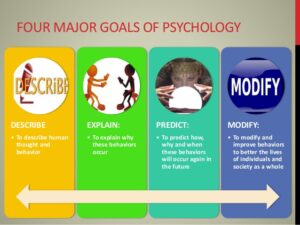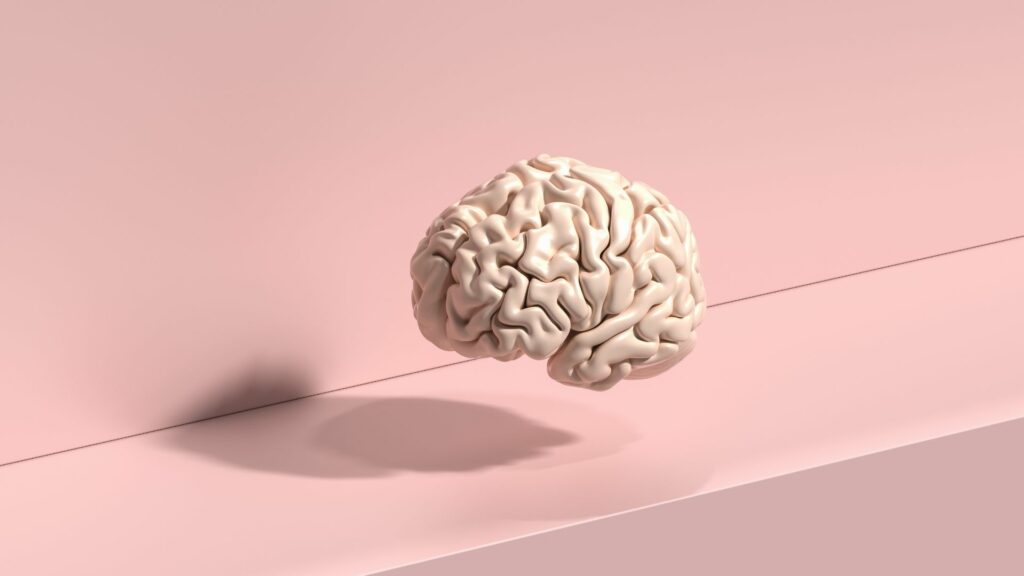Contents
Goals Of Psychology

There are four goals of psychology that help understands the human mind and how it works. A psychologist will study people with different beliefs, cultures, and lifestyles in order to better understand what makes us tick. This knowledge helps us build a society where everyone has an opportunity for success. By understanding more about ourselves we can work on our weaknesses and change our behavior so that we are happier individuals.
What Is Psychology?
 Psychology is still a relatively misunderstood research and practice. Many individuals still believe that it’s all about reading other people’s thoughts, or worse yet, controlling their minds. In reality, if you look at the science and aims of psychology, there is nothing supernatural about it.
Psychology is still a relatively misunderstood research and practice. Many individuals still believe that it’s all about reading other people’s thoughts, or worse yet, controlling their minds. In reality, if you look at the science and aims of psychology, there is nothing supernatural about it.
The field of psychology is the study of both the mind and human behavior. Psychology has many divisions and fields, including clinical psychology, human growth, cognitive process, social behavior, health, and sports.
Psychology as a science is relatively new. Unlike older disciplines, the majority of the important advances in psychology have occurred within the last 100 years or so. Its origins, though, maybe traced back to ancient Greece with philosophers such as Socrates, Plato, and Aristotle.
More modern philosophies were pioneered by people like Wilhelm Wundt, William James, Sigmund Freud, and later on Carl Jung, Alfred Adler, and Erik Erikson.
Four Major Goals Of Psychology
The four major goals of psychology are to describe, explain, predict, and influence or change behavior.
Describe

In everyday life, we describe things using language. The first objective of psychology is to accurately characterize our issues, concerns, and behavior.
Because it allows psychologists to determine if a thought or action is typical or atypical, describing is crucial in the field of psychology. It also allows them to have a deeper understanding of behavior and ideas. Describing implies that we are more aware and conscious of our thoughts and behaviors. As a result, we can better comprehend them. When describing what you’re thinking or feeling, it’s critical to be as descriptive as possible while still keeping things simple. The more information you provide in your description, the more useful it will be for the next goal.
Explain
The ultimate aim of psychology is to explain. Apart from describing thoughts and behaviors, psychologists also try to figure out why they happen and why individuals behave a certain way.
Sometimes, psychologists conduct experiments to evaluate how people respond to various circumstances. Then they seek to create theories and explanations for human behavior. Many psychologists created ideas that either survived the test of time or were debunked by more recent, better ones.
From the perspective of a counselor, they may examine hard evidence to explain a certain problem or conduct physical and psychological examinations, delve into someone’s prior experiences, profound personal study, and so on in order to understand why.
Why do people act this way? Why do certain events cause them to behave in such a manner? Are there any physical, emotional, historical, or psychological factors that may explain why they think and act the way they do?
Predict
The third goal of psychology is to forecast future behavior. By tracking previous observations, they may forecast how and when those same behaviors will recur in the future, how they might alter, and what conditions would cause them.
People in psychology use data from past studies or from their own research to predict what will happen. This is called “predicting.” If something bad is going to happen, a psychologist can help you change your behavior so that the bad thing does not happen again.
Predictions are not only based on hard evidence. They are also based on qualitative information. For example, you might study the person’s relationship with their parents to predict how they will act when they have children. But you can also explore their thoughts from the first two goals of psychology before concluding anything.
In a personal capacity, prediction is a valuable psychological practice that we may or may not be aware that we are practicing. For example, you may know that you get in a bad mood if you haven’t eaten or gotten enough sleep. You might know that your spouse gets mad if you come home late. You might also predict that your best friend is going to be late if they haven’t responded.
Modify
The ultimate objective of psychology is to alter or dominate behavior by managing events and taking control. This goal attempts to bring about good change and greater significance in people’s lives. This influence should be long-lasting enough to improve a person’s quality of life.
For others, it may be a much-needed reprieve. For example, learning how to control or manage a manic episode is an important psychological skill that can help you cope with stress. Stress management, emotion control, and improved general mood are still other examples.
How Can You Apply The Four Goals Of Psychology?

The dog experiment is an example of the four goals of psychology. Pavlov noticed that his dogs would salivate whenever the lab technician brought in food. He felt that this was conditioned behavior because they had not done it previously. It wasn’t until after a while that the dogs would become enthused and drool whenever they saw him.
Pavlov rang a bell every time his dogs were fed to test his hypothesis. As a consequence, the dogs associated the sound of the bell with food over time, resulting in drooling when they heard it. That’s all there is to it. This study has had a major impact on psychology.
You may use the goals of psychology in your personal life to better yourself, your relationships, your business, and even your career. It’s possible to create new habits to live a healthier lifestyle, for example.
Create a goal and describe your present thoughts and behaviors connected to that objective in great depth. Introspect and explain why you are the way you do now, as well as how your future ideas and actions might be influenced by what you’ve stated and illustrated. Finally, make an effort to modify or control your limiting behavior.
If, for example, you have a terrible habit of eating junk food when you’re stressed, describe your feelings during these times in detail. Explain why you behaved the way you did. Make a prediction about how you would act in similar circumstances in the future and replace it with better behaviors such as cooking and consuming a nutritious dinner or chewing gum.
Psychology’s four goals are in a variety of ways: business, marketing, education, medicine, and personal. To utilize these objectives in your life, it’s a good idea to be aware of them.
Conclusion
Understanding ourselves and the way we work is one of the most important things we can do for our society. By understanding more about ourselves, we can begin to change behavior that may be causing us unhappiness in life. A psychologist will study people with different beliefs, cultures, and lifestyles in order to better understand what makes us tick. This knowledge helps us build a society where everyone has an opportunity for success. If you need help understanding how your mind works or if you want some tips on changing habits that are harming your happiness levels please contact my office today! We would love to offer any assistance possible so that you too can find peace within yourself and lead a happy fulfilling life!
For more information, please contact MantraCare. Online therapists are increasingly important in today’s world because they provide a convenient and accessible way for people to receive mental health support and treatment. Visit MantraCare If you are searching for “therapist near me”. Book a trial Online therapy session


